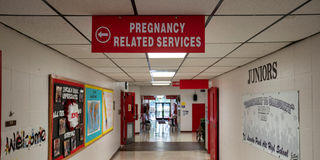Texas school where students bring their babies along

A hallway at Lincoln Park High School, a school for pregnant students and young mothers, in Brownsville, Texas, on November 1, 2023.
What you need to know:
- In Texas, minors' access to contraceptives requires authorisation from an adult, and sex education is not mandatory in schools.
- According to the CDC, the birth rate among adolescents (aged 15 to 19) fell by three per cent in 2022 compared to the previous year, and is 78 per cent lower than the 1991 rate.
Seventeen-year-old Yarezi Alvarado wakes up early to get her backpack ready for school, but she also has to prepare bottles for her one-year-old daughter, Kamila, who rides on the school bus with her.
"When I wake up, I have to get her Pampers ready, her wipes, her milk... And mostly clothes. Because, I mean, she gets dirty," said the teen from Brownsville, Texas.
The bus has safety seats for infants, who ride with their young mothers to Lincoln Park High School in a low-income Hispanic neighbourhood just miles from the border with Mexico.
The school takes girls and women aged 14 to 22 who are pregnant or have recently given birth. While they attend classes, a childcare centre in the same school watches the little ones. Mothers can go there to nurse their babies whenever necessary.
Knowing her daughter is nearby and is being well cared for makes a huge difference, Yarezi said.
Abortion ban
Texas is one of several conservative states that have banned abortion in the year and a half since the US Supreme Court reversed Roe v Wade, the ruling that for a half-century had protected American women's abortion rights.
That reversal has made child care an increasingly sensitive issue, though one that school officials are loath to discuss.
In Texas, minors' access to contraceptives requires authorisation from an adult, and sex education is not mandatory in schools.
Yarezi gets help from her mother, but some of her friends have faced discrimination in their old schools or rejection by family members and live with their child's father or other relatives.
According to the US Centers for Disease Control (CDC), the birth rate among adolescents (aged 15 to 19) fell by three per cent in 2022 compared to the previous year, and is 78 per cent lower than the 1991 rate.
But in Texas, the birth rate among young Hispanic women was 2.4 times higher than that of young white women, according to 2021 data from the NGO Healthy Futures of Texas.
Teen pregnancies are not going to go away, said Cynthia Cardenas, principal of the all-girls school in Brownsville. "It's something that we should have a plan for."
Inadequate access to healthcare, and low levels of education and family income can all contribute to high birth rates among teens and young women, according to the CDC.
A few former Lincoln Park students have returned years later to bring their daughters – now pregnant – to school.
"They need to be told, constantly reminded that being pregnant is not a disability, it's a condition, it's a nine-month condition... and you have that opportunity to be successful," Cardenas said.
The school's daycare centre now tends to 16 infants, its maximum capacity, with several others on a waiting list.
One of a kind
Established in the 1990s, the school is one of a few of its kind in the US. The staff and teachers understand that students may miss the occasional checkup because of a doctor's appointment or after a bad night caring for their babies.
"If this school didn't exist," said Cardenas, "my 53 students that are here now would potentially drop out of school."
According to NGO Child Trends, 53 per cent of adolescent women who become mothers finish school, while 90 per cent of those who are not mothers do so.
Classes at Lincoln Park are in English, but the population – living just minutes from the Mexican border – is mostly bilingual.
Students who have to stay home after giving birth are visited by their teachers. And the school, which has state funding, has a specialised nurse on staff.
“Here, they don't give me homework, I finish everything in school. And I spend more time with my daughter," said Yarezi.
Teachers treat their students with understanding.
Science teacher GeorgeAna Wilson said she sometimes sees a student struggling because "the baby was up all night long; the baby was sick."
"And I say, 'You know what? Take a 10-minute power nap.' That's something you wouldn't see in a normal school."
"In regular schools, they wouldn't understand your situation," said Milla Luevano, another 17-year-old student. "And here they do, they don't judge you, they help you, they communicate with you. And they understand your situation."
Luevano, whose dream is to be a teacher, urges other young women who become pregnant to stay in school.
"Don't give up, because that is something you are going to regret later on – because you want a future," she said.
Yarezi wants to be a gynaecologist someday, and says sticking with school is worth the effort.
"Just don't give up, because your kid needs you," she said.
"And that little baby is your life now."





